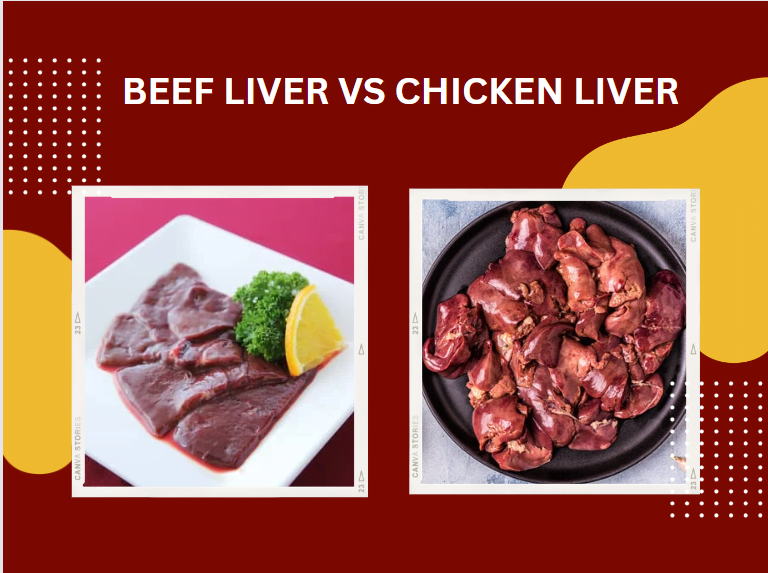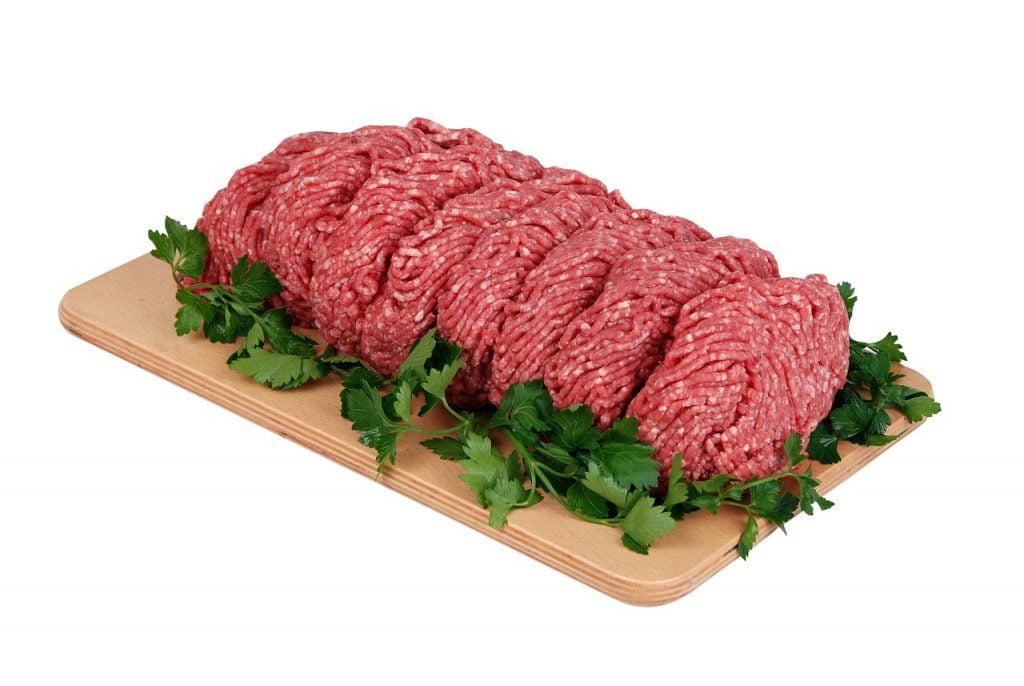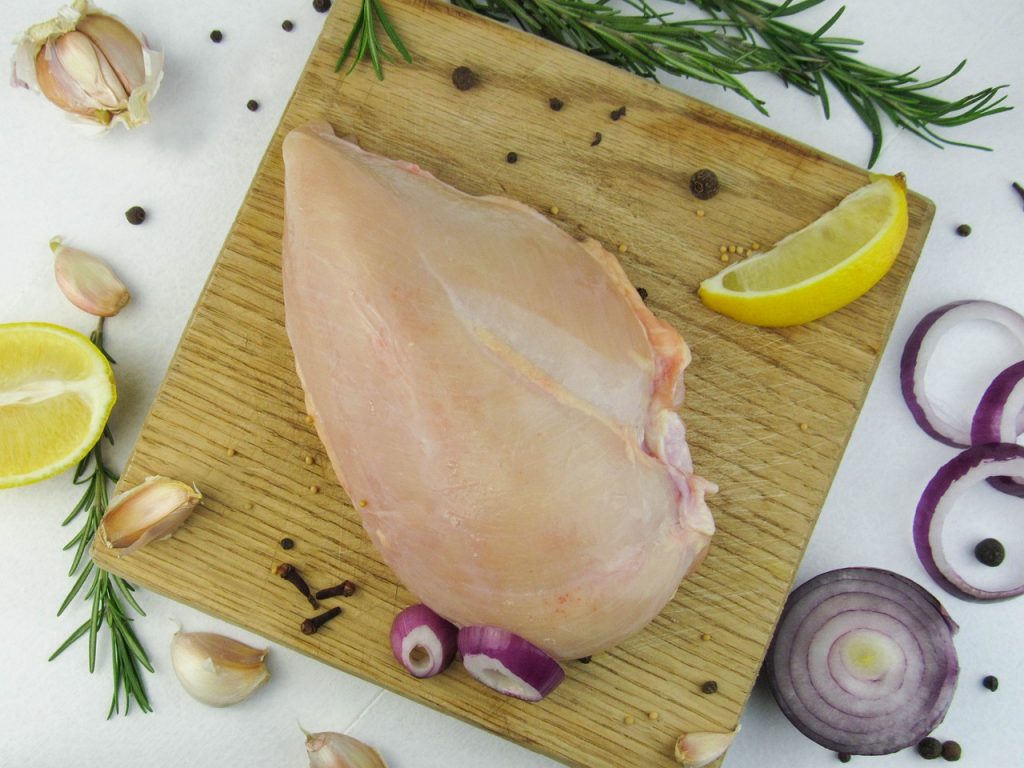
Liver, once relegated to the realm of adventurous eaters and nose-to-tail enthusiasts, has recently surged in popularity as a nutritional powerhouse. Packed with essential vitamins, minerals, and protein, this iron-rich organ meat is making a comeback on dinner plates across the globe. But with two popular options readily available – beef liver vs chicken liver – the question arises: which liver reigns supreme?
Nutritional Showdown: A Tale of Two Titans Beef liver vs Chicken liver
Both beef and chicken liver boast impressive nutritional profiles, but their strengths and weaknesses differ. Let’s delve into the key nutrients to see which contender emerges victorious.
Protein:
Beef liver: This iron-clad champion packs a mighty punch with 25 grams of protein per 100g serving, nearly half your daily recommended intake. This high-quality protein, complete with all essential amino acids, makes it a muscle-building marvel. Imagine it as a microscopic construction crew, ready to repair and rebuild tissues, fuel enzymes, and keep your energy levels soaring throughout the day. Athletes, recovering individuals, and anyone seeking a natural protein boost will find a loyal ally in beef liver. Packs a whopping 25 grams of protein per 100g serving, making it a muscle-building champion.
Chicken liver: While slightly shy of its heavyweight counterpart, chicken liver still brings a respectable 22 grams of protein to the table per 100g. This is still a significant contribution, especially for plant-based eaters or those looking for a lighter protein option. Consider it a skilled sous chef, ready to support muscle maintenance, satiety, and overall metabolic health.Offers a respectable 22 grams of protein per 100g, still a significant contribution to your daily needs.
Vitamin A:
Beef liver: A true heavyweight, boasting over 500% of your daily Vitamin A requirement in a single 100g serving. This powerhouse vitamin acts like a superhero for your vision, guarding against age-related macular degeneration and promoting healthy light-sensitive cells. Additionally, Vitamin A bolsters your immune system, supports cell growth and repair, and even plays a role in healthy fetal development. Talk about a multitasking champion!
Chicken liver: No slouch in this department either, offering 300% of your daily Vitamin A needs per 100g. Think of it as a valiant knight, protecting your vision and immunity, though not quite as invincible as the mighty beef liver. Still, for those seeking a milder-flavored option or a slightly lower Vitamin A intake, it remains a worthy contender.
Iron:
Beef liver: The undisputed iron king, with over 200% of your daily iron needs in a 100g serving.Iron is the oxygen taxi of your body, carrying life-giving oxygen to your cells and ensuring optimal energy production. For individuals with iron deficiency, pregnancy, or heavy blood loss, beef liver can be a game-changer, replenishing iron stores and preventing fatigue.
Chicken liver: A respectable contender, providing 120% of your daily iron needs per 100g. Think of it as a skilled squire, faithfully delivering iron to your cells, though not with the same royal authority as the beef liver king. Nevertheless, for those with slightly lower iron needs or seeking a lower calorie option, chicken liver can be a valuable ally.
B Vitamins:
Beef liver: A treasure trove of B vitamins, including B12, B6, and riboflavin, essential for energy metabolism, nerve function, and red blood cell formation. Vitamin B12 in particular acts like a conductor, orchestrating countless biochemical reactions that keep your energy levels high, your mood balanced, and your nervous system humming. Beef liver is like a B-vitamin buffet, offering a bounty of these essential nutrients for optimal health.
Chicken liver: While not quite as opulent as the B-vitamin feast offered by beef liver, chicken liver still presents a respectable spread. It provides a good amount of B12, B6, and riboflavin, making it a worthy supporter of healthy energy levels, nervous system function, and red blood cell production. Think of it as a cozy B-vitamin bistro, offering a satisfying, though slightly smaller, selection of these vital nutrients.
Copper:
Beef Liver: Abundant in copper, beef liver stands as a guardian of bone health, collagen synthesis, and iron absorption. Copper acts like a skilled artisan, crafting strong bones, supporting the elasticity of your skin, and ensuring your body readily absorbs the iron from other foods. For individuals with osteoporosis, connective tissue issues, or iron deficiency, beef liver can be a valuable nutritional tool.
Chicken Liver: While not as copper-rich as its beefy counterpart, chicken liver still offers a decent amount of this essential mineral. It contributes to bone health, collagen synthesis, and iron absorption, though not with the same potency as beef liver. Think of it as a hardworking apprentice, offering a helpful hand in these vital processes, though not yet wielding the master skills of the beef liver champion.
Cholesterol:
Beef liver: Contains significant cholesterol, which may be a concern for some individuals. However, dietary cholesterol’s impact on blood cholesterol levels is complex and varies depending on individual factors.
Chicken liver: Lower in cholesterol compared to beef liver, making it a potentially better option for those watching their cholesterol intake.
The Verdict: A Split Decision
Based purely on nutrient concentrations, beef liver emerges as the champion due to its higher protein, vitamin A, iron, and copper content. However, chicken liver is not to be underestimated. Its milder taste and lower cholesterol levels make it a more appealing option for some palates and health concerns.
Ultimately, the winner is YOU! Choose the liver that best aligns with your taste preferences and dietary needs. Remember, variety is key to a balanced diet, so feel free to incorporate both beef and chicken liver into your culinary repertoire for a nutrient-rich boost.
Fun Facts: Beyond the Numbers
Liver was a delicacy in ancient Rome, prized for its strength-enhancing properties. Gladiators were believed to consume large amounts of liver before battle.
In Japan, chicken liver is often served raw as sashimi, highlighting its delicate flavor.
Liver is a naturally occurring source of heme iron, the most readily absorbed form of iron by the body. This is especially beneficial for individuals with iron deficiency anemia.
The global liver market is expected to reach $10.4 billion by 2027, driven by increasing awareness of its nutritional value and growing demand for functional foods.
Feel free to explore these links for further information and delicious liver recipes:
National Liver Association: https://liverfoundation.org/
The Nourished Kitchen’s Beef Liver Pâté: https://www.allrecipes.com/recipe/14821/liver-pate/
Serious Eats’ Chicken Liver Mousse: https://www.seriouseats.com/twenty-minute-chicken-liver-mousse-from-the-m
Remember, the key to enjoying liver is proper preparation. Soaking, removing membranes, and using the right cooking methods can help tame its gamey flavor and transform it into a culinary delight. So, the next time you’re at the butcher shop or grocery store, don’t shy away from the liver section. Be it beef liver vs chicken liver embrace its rich history, impressive nutritional profile, and unique culinary potential. You might just discover a new favorite food that’s good for your body and soul!
Thank you for reading blogs from Grandviewfarms.
You may also like our other blogs:
Pasture Raised Cows: A Symphony of Nature, Taste, and Well-being
Farm to Table Beef: The Future of Sustainable Meat Production
From Nose to Tail, Don’t Miss the Tailgate! Epic Butcher Shop Specials Await




